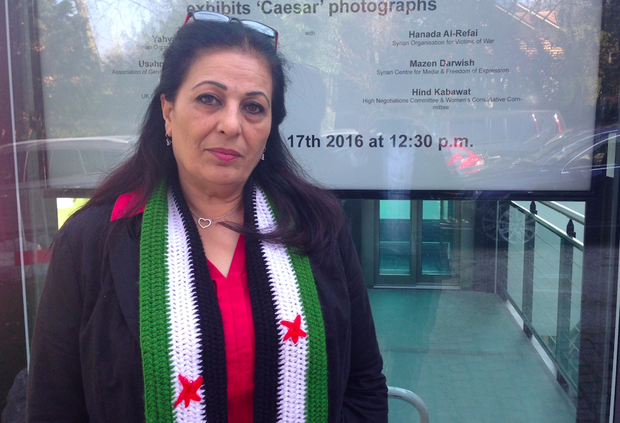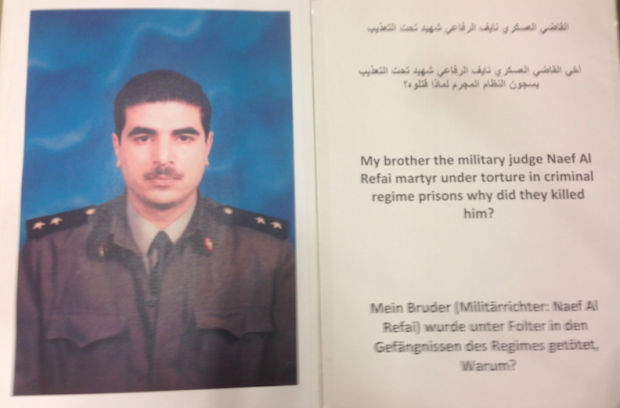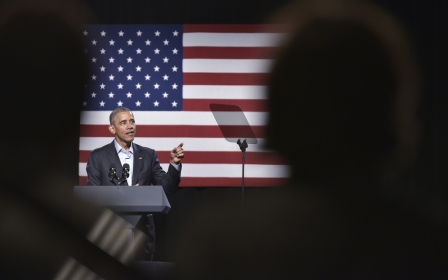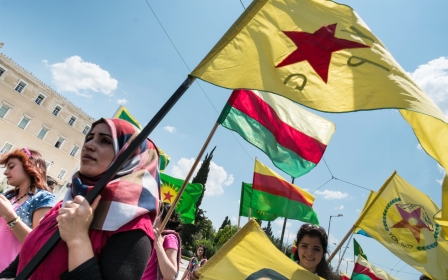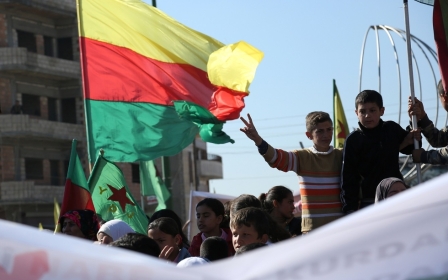Syrian torture victim makes impassioned plea for justice against Assad
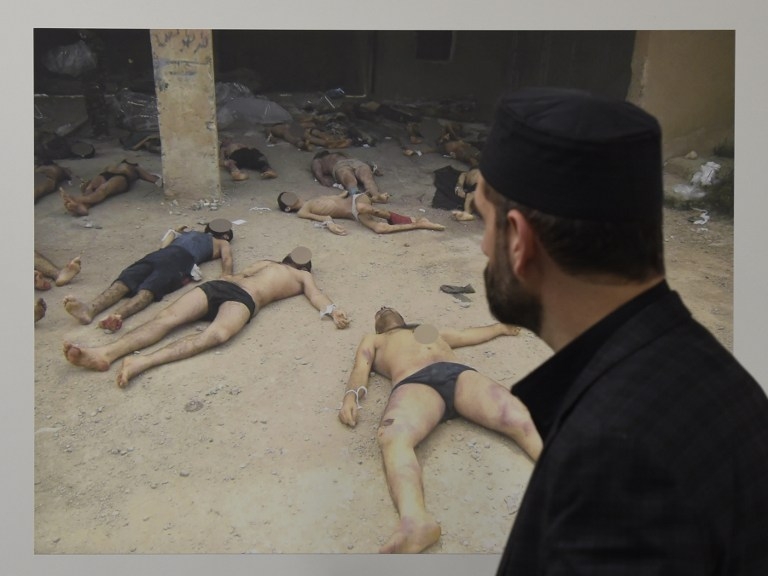
GENEVA, Switzerland - Peace talks aimed at ending the Syrian civil war continued in Geneva on Thursday, with politicians saying the latest round of talks represent the best hope yet to strike an agreement to end the brutal conflict.
As delegations from the Syrian government and the opposition sat down with international politicians to negotiate at the UN’s plush Palace of Nations, under the serenity of a cloudless blue sky surrounded by an equally blue sparkling Lake Geneva, three victims of Syria’s war gathered nearby to make a desperate plea for justice and accountability.
Nestled down a narrow twisting road lined with large square stones placed in front of quirky green and pink Swiss chalets, the glass-fronted Swiss Press Club exudes the natural class that epitomises upscale Geneva.
However, on Thursday, with a chill in the air befitting of the surrounding snow-capped mountains, sickening photos of Syrians tortured to death in the prisons of President Bashar al-Assad adorned the walls at an event organised by the Syrian Organisation for Victims of War.
The photos were from a cache of 55,000 images smuggled out of Syria by a former military photographer who fled the country and is codenamed Caesar for his own protection.
Stomach-churning photos of Syrian corpses lying dead, many of them shown lying bloodied and starved to their bare bones, have been verified by American authorities, who say they have confirmed at least 11,000 deaths by analysing the images.
Sitting on the stage among a panel of prominent Syrian activists, alongside the British Envoy to Syria Gareth Bayley, Hanada al-Refai told a hushed room full of journalists and diplomats that she had a message to those at the Palace of Nations from her experience “under the criminal Assad regime”.
Wearing the three-starred green, white and black flag of the Syrian opposition, Refai told the audience how she had been imprisoned for seven months from 15 March 2012 for her peaceful activism in support of protests against Assad.
“They humiliated me, they beat me - it was hell,” she said. “You can’t imagine. No matter how much we explain you can’t imagine.”
She said she saw men pleading for their lives, dying, being hanged from bathroom ceilings, bloodied after being beaten by prison guards she described as “sadists who enjoyed torturing the prisoners”.
Refai was released after seven months when she was summoned to a military court where a civilian official stamped her hand and told her to leave. She said no legal process took place.
Speaking through tears, Refai moved onto to explain that her pain was not ended when she was released from detention. One week after she had been arrested her brother Naef, a military judge, was picked up and thrown in the notorious Sedihnya prison, where there have been numerous reports of prisoners being tortured to death.
“He was a judge but he couldn’t get justice for himself,” Refai said, as she lifted up her black rimmed glasses to wipe away the tears rolling down her cheeks.
After two years and two months in prison Refai found out that her brother had been killed when another sibling tried to visit him in prison.
“They told us he had died nine days ago and that they had buried him."
With no body, no funeral, no grave and no way of finding out what had happened, Refai was left to piece together her brother’s story from freed prisoners who had shared his cell.
After the press conference finished, while standing smoking a cigarette overlooking peaceful gardens a world away from the horror of which she spoke, Refai said her brother was beaten every day for two years with an iron stick by prison guards.
“His bones were broken. He lost so much weight. He was vomiting blood. He died unable to eat or drink.”
Refai explained that when the Caesar photos were published she immediately starting scouring through the grizzly images to try and find her brother.
“I was scared to see him but I wanted to know if he was there.”
She didn’t find her brother among the thousands of images but she said looking through them was pain enough.
“He died just like those people in the photos. Starved. Beaten. Thrown in the ground.”
Refai no longer lives in Syria, but fled six months ago from Turkey to Greece in a boat on a perilous journey with her mother and two daughters. Knowing the trip to Europe would be dangerous made no difference to Refai, who said that her family was “running from death – maybe we will die but maybe we will have the chance to live our lives in peace”.
She now lives in Austria and is learning German to try and rebuild her life.
Refai said she was in Geneva to try and influence the peace talks by reminding the world of what Assad has done to his own people.
“We have held this exhibition to try and affect the talks because we want Assad to be punished for what he has done,” she told Middle East Eye. “I couldn’t save my brother but there are still tens of thousands of detainees there and they must put the detainee issue at the top of the agenda [in the talks].”
On a personal level, Refai, who said her plea was a “scream to the world to listen,” said she wants to be able to commemorate her brother’s death in “the same way anyone else would want”.
“I want his body. I want a grave to put flowers on.”
After listening to Refai and the other panellists’ stories, British envoy Bayley said he felt “privileged” to have heard them speak and he emphasised the importance of the photo exhibition.
“The Caesar photographs are compelling evidence, brutally and forensically documented, of the Assad regime’s calculated widespread attack on the Syrian people as a form of collective punishment,” he said.
Pointing to other envoys present – who were from Sweden, Canada, Denmark, the Netherlands and France - Bayley said that despite there being much discussion of the international community giving up on removing Assad and instead prioritising the fight against the Islamic State group, that the Syrian president must be held accountable for his government’s crimes.
“Justice focuses most specifically on Bashar al-Assad,” he said. “My country (Britain) has been clear that there must be a transition away from Assad – this man has not only failed his country, he has attacked his country.”
"We are absolutely clear and remain steadfast in saying that human rights violations and abuses in Syria are unacceptable and perpetrators must be held to account.”
Bayley added that despite the latest peace talks not being direct ones between the Syrian government and opposition, they represent a “glimmer of hope” that has grown as a recently agreed ceasefire has held in place.
“We must progress through the laborious process of politics to seek an end to this war.”
New MEE newsletter: Jerusalem Dispatch
Sign up to get the latest insights and analysis on Israel-Palestine, alongside Turkey Unpacked and other MEE newsletters
Middle East Eye delivers independent and unrivalled coverage and analysis of the Middle East, North Africa and beyond. To learn more about republishing this content and the associated fees, please fill out this form. More about MEE can be found here.


